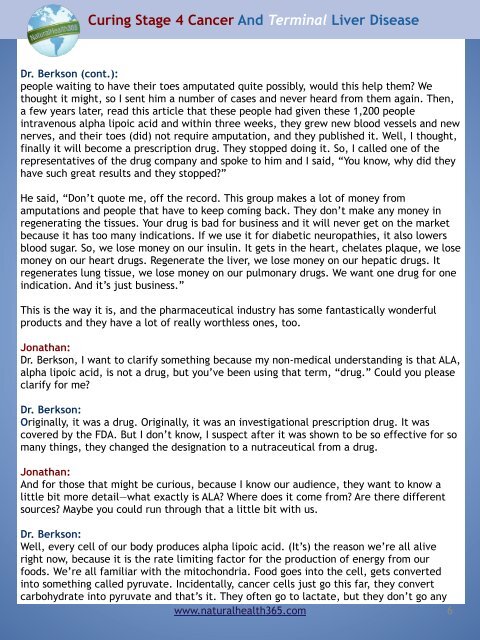TRANSCRIPT
curing-stage-4-cancer-and-terminal-liver-disease
curing-stage-4-cancer-and-terminal-liver-disease
Create successful ePaper yourself
Turn your PDF publications into a flip-book with our unique Google optimized e-Paper software.
Curing Stage 4 Cancer And Terminal Liver Disease<br />
Dr. Berkson (cont.):<br />
people waiting to have their toes amputated quite possibly, would this help them? We<br />
thought it might, so I sent him a number of cases and never heard from them again. Then,<br />
a few years later, read this article that these people had given these 1,200 people<br />
intravenous alpha lipoic acid and within three weeks, they grew new blood vessels and new<br />
nerves, and their toes (did) not require amputation, and they published it. Well, I thought,<br />
finally it will become a prescription drug. They stopped doing it. So, I called one of the<br />
representatives of the drug company and spoke to him and I said, “You know, why did they<br />
have such great results and they stopped?”<br />
He said, “Don’t quote me, off the record. This group makes a lot of money from<br />
amputations and people that have to keep coming back. They don’t make any money in<br />
regenerating the tissues. Your drug is bad for business and it will never get on the market<br />
because it has too many indications. If we use it for diabetic neuropathies, it also lowers<br />
blood sugar. So, we lose money on our insulin. It gets in the heart, chelates plaque, we lose<br />
money on our heart drugs. Regenerate the liver, we lose money on our hepatic drugs. It<br />
regenerates lung tissue, we lose money on our pulmonary drugs. We want one drug for one<br />
indication. And it’s just business.”<br />
This is the way it is, and the pharmaceutical industry has some fantastically wonderful<br />
products and they have a lot of really worthless ones, too.<br />
Jonathan:<br />
Dr. Berkson, I want to clarify something because my non-medical understanding is that ALA,<br />
alpha lipoic acid, is not a drug, but you’ve been using that term, “drug.” Could you please<br />
clarify for me?<br />
Dr. Berkson:<br />
Originally, it was a drug. Originally, it was an investigational prescription drug. It was<br />
covered by the FDA. But I don’t know, I suspect after it was shown to be so effective for so<br />
many things, they changed the designation to a nutraceutical from a drug.<br />
Jonathan:<br />
And for those that might be curious, because I know our audience, they want to know a<br />
little bit more detail—what exactly is ALA? Where does it come from? Are there different<br />
sources? Maybe you could run through that a little bit with us.<br />
Dr. Berkson:<br />
Well, every cell of our body produces alpha lipoic acid. (It’s) the reason we’re all alive<br />
right now, because it is the rate limiting factor for the production of energy from our<br />
foods. We’re all familiar with the mitochondria. Food goes into the cell, gets converted<br />
into something called pyruvate. Incidentally, cancer cells just go this far, they convert<br />
carbohydrate into pyruvate and that’s it. They often go to lactate, but they don’t go any<br />
www.naturalhealth365.com 6


